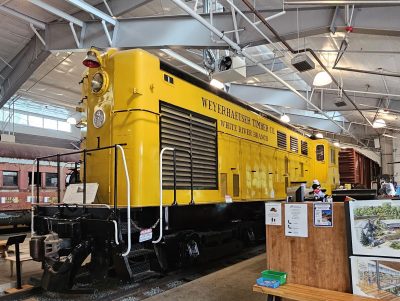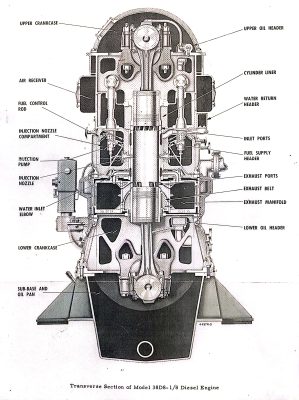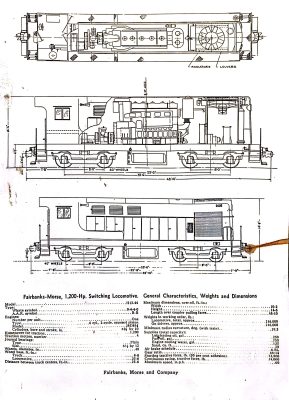When first walking into the Train Shed, guests are immediately confronted by a ginormous locomotive, looking more like a yellow wall than a locomotive. This is Weyerhaeuser’s White River Branch #1, the only diesel purchased for their Enumclaw, Washington sawmill. Locomotive #1 represents the rush of manufactures trying to capitalize on the post-war diesel locomotive boom.
The story begins with the Fairbanks-Morse Company (F-M). First famous for making scales, by the late 19th century F-M had expanded to include windmills, farm tools, and even railway equipment. The company began developing small gas engines starting in the 1890s, leading to the development of diesel engines in the 1910’s and 20’s. The culmination of this development was a two-stroke opposed-piston diesel engine in 1939, called the FM 38D-8 1/8.
Two-stroke diesel engines allow for fewer moving parts than a four-stroke, reducing weight and having a higher power-to-weight ratio. This means that in situations where space is at a premium, two-stroke diesels are more valuable. Furthermore, an opposed-piston engine refines this by placing two pistons facing each other in one cylinder, thus eliminating the need for cylinder heads and further reducing weight, materials, and engine height.
Fairbanks-Morse won a contract from the U.S. Navy in 1939 to place their engine in both ships and submarines, and following that success attempted to sell diesel-electric locomotives to railroads, doing so in 1944. To catch the appeal of both the public and railroad officials, F-M had famous industrial designer Raymond Lowey handle the styling.
Despite their powerful pulling characteristics, Fairbanks-Morse struggled to gain a foothold in the railroad locomotive market. Their engines themselves could be difficult and time consuming to maintain, and the market was oversaturated with builders and locomotives. Fairbanks-Morse only constructed 1,460 locomotives, with the last domestic locomotive built in 1958 and the final export locomotive to Mexico in 1963.
However, Fairbanks-Morse continued to find success with their diesel engines in marine applications. Today, their engine business still exists as Fairbanks Morse Defense.
Next time on A Closer Look, the story of Weyerhaeuser #1 itself!




